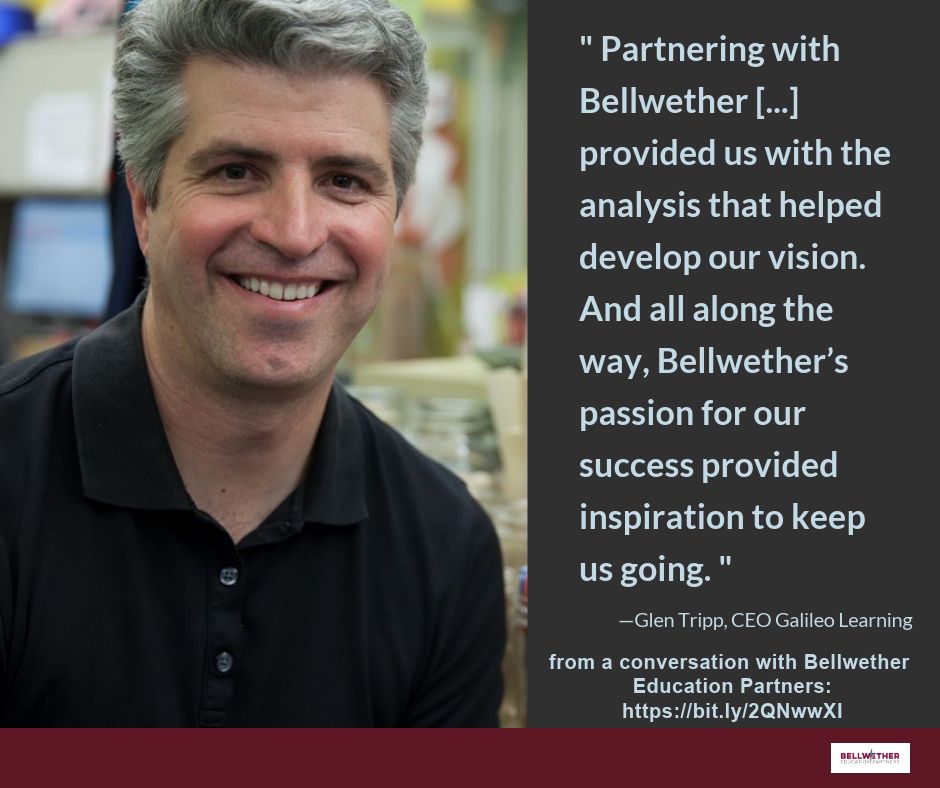Oakland, California-based Galileo Learning offers engaging and high-quality Science, Technology, Engineering, Arts, and Math (STEAM) summer programming for students in the San Francisco Bay Area, Southern California, and Chicago. Their programs aim to foster lifelong innovators through project-based learning and exploration.
Galileo has a high bar for quality: they select top-notch instructors, have low student-staff ratios, and invest in extensive curriculum development. This unwavering commitment to excellence means the programs typically cost about 25% more than city-operated summer programs.
But Galileo has a deeply held belief that all students should have the opportunity to become innovators, so in their model, families paying the full cost of camp tuition subsidize the attendance of those who cannot afford the program. With 10% of their students receiving scholarships, Galileo came to Bellwether in 2016 and asked the question: how can we increase the number of low-income students we serve?

When my colleagues Lina Bankert, Genny Orr, and I arrived at their Oakland headquarters, we found ourselves walking into an innovation zone. Right inside the front door, staff worked on prototypes of machines students would build the next summer at camp. The open-concept office was spacious, fostering collaboration and community. Glen Tripp, Galileo’s CEO, invited us to attend their all-staff meeting, where we witnessed humor and laughter, support and care for one another, and unbounded energy.
Over the next several months, we developed a three-pronged strategy to help Galileo achieve its impact goals: 1) increase scholarships to attend Galileo camps, 2) build strategic partnerships to extend Galileo’s approach to new educational settings, and 3) leverage the existing corps of teachers to infuse innovation thinking into more classrooms.
As of 2019, Galileo has increased the percentage of students receiving scholarships from 10% to 15% and is on track to provide scholarships to 22% of campers in 2020, equaling about 20,000 kids. I spoke with CEO Glen Tripp to understand more about Galileo’s model and how they were able to accomplish these impressive numbers.
This conversation has been lightly edited for length and clarity.
What motivated you to set an ambitious scholarship goal?
Galileo’s mission is to develop innovators who envision and create a better world, and we believe that impact should belong to all kids. Finding fulfilling work in the future will require innovation skills, and our educational systems are not set up to deliver them. While many are understandably trying to close the math and reading achievement gaps, a new “innovation achievement gap” has emerged, and Galileo wants to combat this.
Initially we set a goal of awarding scholarships to 10% of our students. In 2019, we made it to 15% and in 2020 we are targeting 22%. That means that 20,000 students will receive partial to full scholarships in 2020, with very little foundation or public funding involved.
What changes did you make to your processes to achieve such dramatic growth in scholarship awards?
Working with Bellwether helped uncover several points of friction in our scholarship-awarding process that prevented low-income families from accessing our programs. The three main changes we made were: 1) Awarding scholarships in real time as applications came in, rather than waiting months for a specific award date, which allowed us to tell families who applied what they had been awarded almost immediately; 2) awarding more weeks per student; and 3) equipping our program leaders at the site level to award more weeks in real time during the program. Under the new system, leaders are fully empowered to hand out a special code to scholarship recipients who might like to attend an additional week of camp.
One of the challenges we discussed when working together was how to build awareness of financial assistance for your programs. How did you communicate to families about your scholarships?
3,000 Galileo educators served 35,000 families over the course of 2019, and the number one thing we did was to catalyze those two groups to spread the word about scholarships. The second was to cultivate relationships with more than 40 organizations to help us encourage applicants. We spent under $5,000 marketing the scholarship program.
How have you leveraged partnerships — with districts, charter management organizations, or others — to ensure you are reaching the students you want to reach? What advice would you give to other out-of-school organizations about how to build effective partnerships with school systems?
There are several school districts who are now paying for their lower income students to attend Galileo, and we are also empowering some nonprofits to actually run Galileo programs in their communities. Our advice is to start with small experiments so that the two parties can learn to work together and build mutual enthusiasm for the project. The Boys and Girls Clubs of the Peninsula have been running Camp Galileo programs for five years now, and it’s going amazingly well. But we both had to be determined and patient during the first two years to get it to a great place.
What did you learn from the strategic planning process that you will apply to your next strategic plan? What advice would you give to others engaging in a similar process?
The strategic planning process allowed us to see how much opportunity there was to leverage existing capacity in our programs. We’ve been able to more than double the number of scholarships just by improving existing processes. The next big step is to create systems for empowering hundreds of nonprofits who would like to put our training, curriculum, supplies, and operating systems to use with the kids they already serve.
Partnering with Bellwether enabled us to get clearer on our commitment to broadening our impact, and provided us with the analysis that helped develop our vision. And all along the way, Bellwether’s passion for our success provided inspiration to keep us going.
January 15, 2020
Summer Camp Offers Numerous Scholarships to Low-Income Campers: A Q&A With Galileo Learning’s Glen Tripp
By Bellwether

Share this article